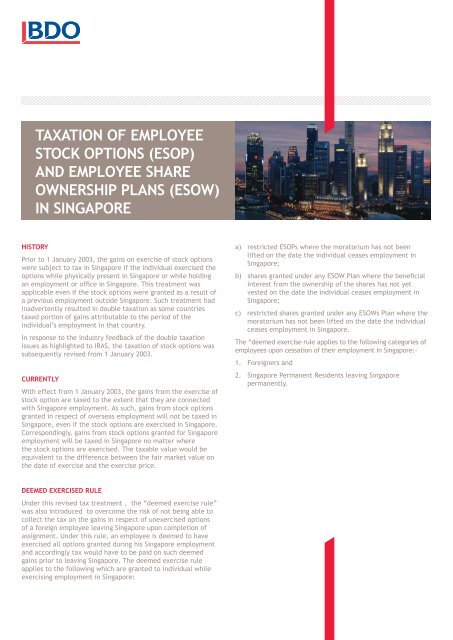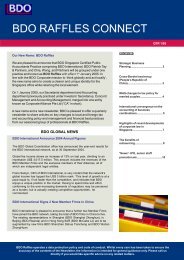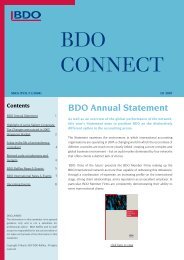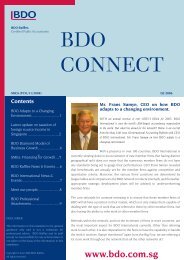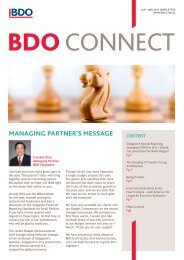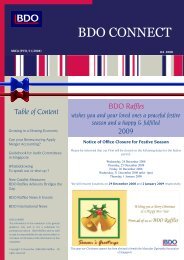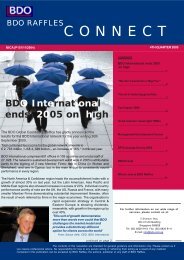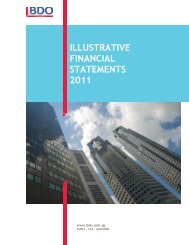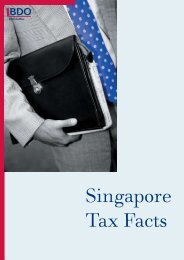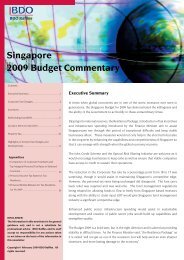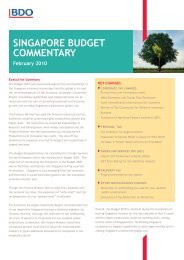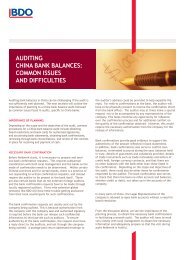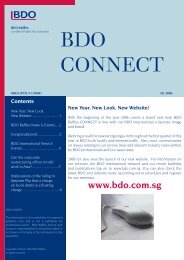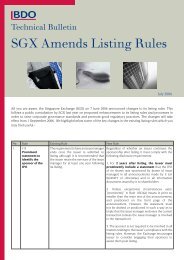(ESOP) ANd EMPLOYEE SHARE OWNERSHIP ... - bdo singapore
(ESOP) ANd EMPLOYEE SHARE OWNERSHIP ... - bdo singapore
(ESOP) ANd EMPLOYEE SHARE OWNERSHIP ... - bdo singapore
You also want an ePaper? Increase the reach of your titles
YUMPU automatically turns print PDFs into web optimized ePapers that Google loves.
TAXATION OF <strong>EMPLOYEE</strong><br />
STOCK OPTIONS (<strong>ESOP</strong>)<br />
and <strong>EMPLOYEE</strong> <strong>SHARE</strong><br />
<strong>OWNERSHIP</strong> PLANS (ESOW)<br />
IN SINGAPORE<br />
History<br />
Prior to 1 January 2003, the gains on exercise of stock options<br />
were subject to tax in Singapore if the individual exercised the<br />
options while physically present in Singapore or while holding<br />
an employment or office in Singapore. This treatment was<br />
applicable even if the stock options were granted as a result of<br />
a previous employment outside Singapore. Such treatment had<br />
inadvertently resulted in double taxation as some countries<br />
taxed portion of gains attributable to the period of the<br />
individual’s employment in that country.<br />
In response to the industry feedback of the double taxation<br />
issues as highlighted to IRAS, the taxation of stock options was<br />
subsequently revised from 1 January 2003.<br />
Currently<br />
With effect from 1 January 2003, the gains from the exercise of<br />
stock option are taxed to the extent that they are connected<br />
with Singapore employment. As such, gains from stock options<br />
granted in respect of overseas employment will not be taxed in<br />
Singapore, even if the stock options are exercised in Singapore.<br />
Correspondingly, gains from stock options granted for Singapore<br />
employment will be taxed in Singapore no matter where<br />
the stock options are exercised. The taxable value would be<br />
equivalent to the difference between the fair market value on<br />
the date of exercise and the exercise price.<br />
a) restricted <strong>ESOP</strong>s where the moratorium has not been<br />
lifted on the date the individual ceases employment in<br />
Singapore;<br />
b) shares granted under any ESOW Plan where the beneficial<br />
interest from the ownership of the shares has not yet<br />
vested on the date the individual ceases employment in<br />
Singapore;<br />
c) restricted shares granted under any ESOWs Plan where the<br />
moratorium has not been lifted on the date the individual<br />
ceases employment in Singapore.<br />
The “deemed exercise rule applies to the following categories of<br />
employees upon cessation of their employment in Singapore:-<br />
1. Foreigners and<br />
2. Singapore Permanent Residents leaving Singapore<br />
permanently.<br />
Deemed Exercised Rule<br />
Under this revised tax treatment , the “deemed exercise rule”<br />
was also introduced to overcome the risk of not being able to<br />
collect the tax on the gains in respect of unexercised options<br />
of a foreign employee leaving Singapore upon completion of<br />
assignment. Under this rule, an employee is deemed to have<br />
exercised all options granted during his Singapore employment<br />
and accordingly tax would have to be paid on such deemed<br />
gains prior to leaving Singapore. The deemed exercise rule<br />
applies to the following which are granted to individual while<br />
exercising employment in Singapore:
The taxable value under the deemed exercise rule is computed as:<br />
A – B<br />
Where<br />
A – is the open market price of the shares one month before the<br />
date the individual ceases employment or the date of the grant<br />
of the stock options, whichever is the later ; and<br />
B – is the<br />
• exercise price payable under the unexercised <strong>ESOP</strong>; or<br />
• exercise price of the shares under restricted <strong>ESOP</strong>; or<br />
• price paid or payable for shares acquired under an ESOW Plan<br />
with vesting imposed (with no moratorium); or<br />
• price paid or payable for restricted shares acquired under an<br />
ESOW Plan, as the case may be.<br />
Tracking Option<br />
As an alternate to the deemed exercise rule, the employer<br />
may elect for the tracking option scheme instead. Under this<br />
scheme, the employer is required to compute and to report<br />
the gains to the IRAS. However, the payment of taxes may be<br />
deferred to the date when the options are exercised. In order<br />
to be eligible for the tracking option, employers are required to<br />
provide an undertaking that taxes would be paid. Additionally,<br />
there are several conditions that need to be satisfied in order to<br />
be eligible for the tracking option.<br />
Prior approval must be sought from the IRAS before the<br />
employer could operate under this scheme.<br />
The final gain must be reported to IRAS in order to process the<br />
employee’s tax clearance assessment prior to departure from<br />
Singapore.<br />
However, in the event that the actual gains derived upon the<br />
exercise of the options are lower than that computed under the<br />
“deemed exercise” rule, the employee may apply to the IRAS to<br />
have a reassessment of his tax liability:-<br />
• Within 6 years from the year of assessment following the year<br />
in which the deemed exercise rule is applied ; and<br />
• To furnish the relevant documentation to demonstrate that<br />
the actual tax liability is lower than that computed under the<br />
“deemed exercise rule”.<br />
Rohan Solapurkar<br />
Tax Director<br />
Tax Advisory<br />
rohan@<strong>bdo</strong>.com.sg<br />
Direct: +65 6828 9171


